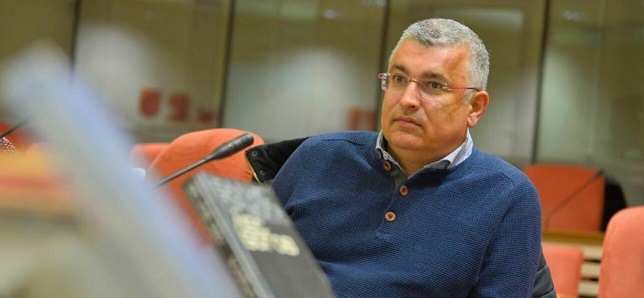by Segejus Kanovičius
Beggars ask for all sorts of things–money, drugs, clothes. The average passer-by looks at the beggar trying to determine if he really is in need, and often passers-by pretend they haven’t seen him.
There is a category of beggar in Lithuania which everyone seems to see, and everyone seems to agree they are truly unfortunate, but these beggars only receive donations a few times during the year. From the microphone. And they get wreaths. These are the murdered Jews of Lithuania.
They have been asking for donations for a long time but they don’t ask for much, just historical justice. And it’s not they who should be ashamed, but those who are reluctant to offer historical justice. And stingily keep it from Jews and the public. When the living [Holocaust survivors] remind them the historical truth must be restored, they, those who keep the historical truth away from our eyes, immediately turn wild, and call the beggars, the living and the dead together, agents of the Kremlin. Even though no one serves the Kremlin better than in this way, by attempting to portray a lie as the truth, through avoidance and by presenting public arguments which don’t stand up to any criticism.
The dead say Jonas Noreika voluntarily served the Nazis, sent us into ghettos and divided up the property stolen from us. The beggars from the pits ask we remove the crown of the anti-hero. Those giving alms have their hair stand on end and out of fear begin to send out findings which contradict common sense, calling to their aid historians of the noble manor estates, and send out to the Dugins of the Kremlin the clear report: this is our weak spot, this is where you should attack. The murdered say: the International Commission for Assessing the Crimes of the Nazi and Soviet Occupational Regimes in Lithuania formed by decree of the president of Lithuania says the LAF [Lithuanian Activist Front] was an anti-Semitic organization, so please, take down the signs honoring Kazys Škirpa, the leader of this organization. The manor historians and the magicians who turn the truth into a lie again take up their magic wands and again send out the report: this is our weak spot, this is where you should attack.
The murdered say: the Lithuanian History Institute has provided proof Jonas Krištaponis had the blood of innocent Jews on his hands, so be nice and take down this monument to the murderers of Jews in Ukmergė. There isn’t even a choir of lies here. The choir of lies is singing complete silence in tandem. Absolute silence. But the statue remains standing. O you the living, those who demand at least a tiny pinch of historical truth to place in the outstretched hands of the murdered. are condemned to ostracism. The request for historical truth and justice only assumes the form of a request for alms when one party does not want to recognize that historical truth in any way.
The shame does not accrue to the “beggars” who ask for that truth as an offering. The shame accrues to those who do not give it and who constantly lie that they don’t have it.
The begging in the form of ashamed speech offered at Ponar and other sad sites in no way compensates for the simple historical truth which must be admitted eventually in any event. Better now than later. Because one would rather take pride in the courage and openness of the state, and one doesn’t want to continue to grieve out of shame before the victims and the world.
It’s a stupid thing that the singers and conductors in the choir of lies fail to understand the little songs and ditties they sing publicly are making fun of those who were murdered. Wasn’t it enough to murder them once, do they really need to be murdered yet again by these mendacious oratorios about them?
Let’s take a look at what we have done from the perspective of those who were murdered. What if they arose from the grave and began to walk along Kazys Škirpa Alley, went to visit the plaque dedicated to Noreika or to some schools named after him, or walked over to the monument in Ukmergė dedicated to their murderer?


